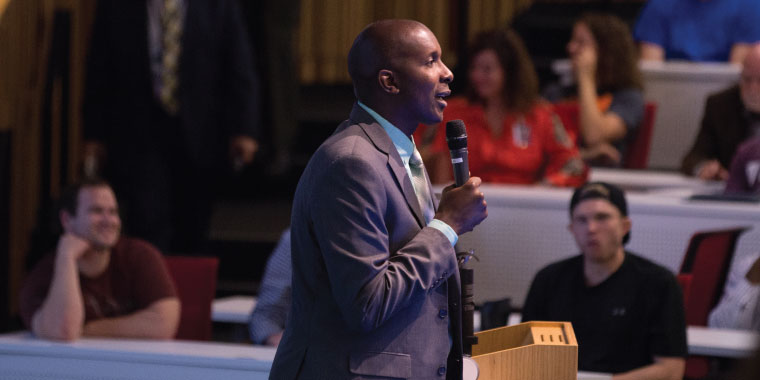Damon Tweedy, MD, Presents Lecture on Race in Medicine

“Why are you in my class?”
That question – posed by a Duke University medical school professor to Damon Tweedy, then a first-year medical student – became a defining moment for the now doctor of psychiatry, lawyer and best-selling author.
Dr. Tweedy believes the professor assumed, because of the color of his skin, that he was a maintenance man in the classroom to change out a lightbulb; the exchange with the professor had a lasting impact on Tweedy.
“A situation can happen to you that can reinforce an internal belief you’re already struggling with,” Tweedy said.
That internal belief was a sense of not belonging in medical school. It’s an issue Tweedy believes many African American students face in medical schools, “where there’s a sense of isolation … not feeling like they belong.”
Tweedy is the author of "Black Man in a White Coat",
a New York Times bestseller that reflects on his experiences inside the medical profession to include racism. He recently spoke to 400 KCU students, faculty and staff in Kansas City; the event was live streamed to the KCU Joplin campus. The University, along with the Center for Practical Bioethics, sponsored the event.
“I listened to the lecture and I thought it was phenomenal,” said Tarris Rosell, PhD, division chief of bioethics at KCU. Rosell said the idea to invite Tweedy to speak came out of a strategic planning session of the Center for Practical Bioethics.
Second-year student doctor Dominic Royster read Tweedy’s book during his summer break and said he was excited to see him speak at KCU.
“Dr. Tweedy's personal testimony as a medical student, physician and patient addressed the issues minorities face in the health care system,” Royster said. “There were many moments that gave me pause as Dr. Tweedy's experiences very much mirrored my own.”
“I walked away with a new sense of motivation as a minority medical student,” Royster added. “I will strive in my academic and clinical pursuits to help break down racial barriers in doctor-patient care.”
Tweedy acknowledges that the issues facing race and medicine will obviously not be resolved in a one-hour discussion. But it is a starting point, and each student can have an impact.